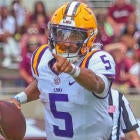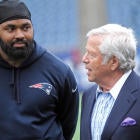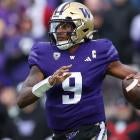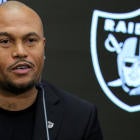When Junior Seau is inducted into the Pro Football Hall of Fame on Saturday, he'll bring with him one of the most complicated legacies in recent NFL history.
The Seau who will be celebrated this weekend is the fierce linebacker who fought off Father Time for better part of two decades.
Seau played one of the league's toughest positions for 20 seasons. To this day, no defensive player in NFL history has put together a longer career.
The linebacker's star-studded NFL journey began on April 22, 1990, when the Chargers made Seau the fifth overall pick in the NFL Draft.
The former Southern California star was like a bolt of lightning for the Chargers' defense. Seau started 15 games during his rookie year and finished second on the team in tackles.
In 1992, Seau was one of the emotional leaders of a recharged San Diego defense that ranked fourth overall in the NFL. It was the Chargers' best defensive showing since the team finished second overall in 1979.
The 1992 season marked the first of six times that Seau would be named first-team All-Pro. Seau was also voted to the Pro Bowl that year, which marked the second of 12 straight trips he would make to Hawaii.
Seau led the 1992 team in tackles and was a large reason the 11-5 Chargers made the playoffs for the first time since 1982.
Before Seau was drafted, San Diego had missed the playoffs for seven straight seasons. After Seau was drafted, the Chargers went to the playoffs in three of his first six seasons.
The year everyone in San Diego remembers is 1994, when the Chargers made their improbable run to Super Bowl XXIX.
How important was Seau to that 1994 team?
To put it in perspective, just close your eyes and try and name five Chargers from the 1994 team. It's not easy as you think.
One of the Chargers from that team, Rodney Harrison, recently explained what Seau meant to the 1994 team.
"He was the guy that kept that team together, made us believe we could win. He was the catalyst, the emotional leader, the spiritual leader, the best player," Harrison told the Associated Press. "He was the best defensive player in the league. His teammates respected him. He made them believe and did something a lot of people didn't think we could do, and that was win a lot of games and beat Pittsburgh at Pittsburgh."
Beating Pittsburgh at Pittsburgh was something no one outside of San Diego thought was possible, but thanks to Seau, the six-point underdog Chargers were able to stun the Steelers 17-13 in the AFC Championship Game.
Seau would register 16 tackles in the AFC title game, including the open-field tackle of Pittsburgh running back John L. Williams that you see below.
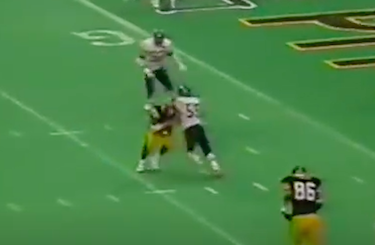
Seau's tackle was was pivotal, as it came on third-and-goal with 1:08 left in the game. On the next play, the Steelers would fail on a fourth-down pass, sending the Chargers to the franchise's first Super Bowl.
Seau would later rate the AFC title game win over the Steelers as the third-best moment of his career (the No. 1 moment also came in 1994, when Seau intercepted John Elway in the regular-season opener to seal a wild 37-34 win over Denver).
The 1994 season would turn Seau into a bona fide star.
The hard-hitting linebacker was ferocious on the field, but off the field, he was an outgoing jokester who was always out to please everyone.
Seau showed off his personality during a 1994 visit to the Tonight Show with Jay Leno.
During the interview, not only did Seau jokingly chide Leno for being overdressed, the Chargers linebacker also ended up bench pressing the host.
The interview acutally went pretty well considering Seau, who was 25 at the time, didn't learn English until he was almost seven years old.
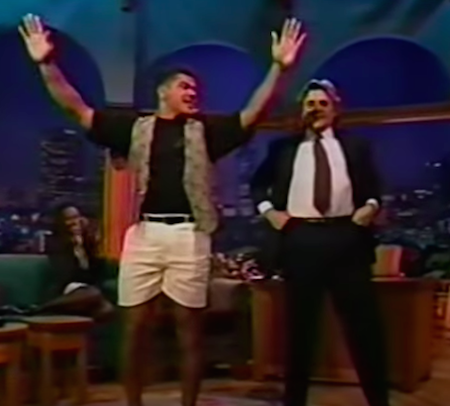
The 1994 season ended up being the apex of Seau's Chargers career as he would never play in another playoff game with San Diego.
Although Seau was eventually traded to the Dolphins in 2003, his heart was always with San Diego and that was evident during his first season in Miami.
A Week 7 game between the Chargers and Dolphins had to be moved from San Diego to Phoenix because fires were raging across Southern California.
The game was supposed to be a homecoming for Seau, but instead, he played with a heavy heart.
"That was the hardest game I've had to play," Seau said after a 26-10 Dolphins win.
After three years with the Dolphins, Seau decided to call it quits.
"It's pretty easy. When a team doesn't want you or need you, retire buddy," Seau said at his retirement ceremony in August 2006.
Seau's retirement didn't last long though because two days after his ceremony, the Patriots were on the phone trying to get him to sign.
The 37-year-old linebacker would end up signing a series of one-year deals in New England, with hopes that he would finally win a Lombardi Trophy.
That trophy almost came in 2007 with the undefeated Patriots, but David Tyree's impossible helmet catch would keep Seau from winning his first Super Bowl ring.
The aforementioned Harrison, who was Seau's teammate for nine years in San Diego (1994-2002), was on the coverage for New England on that fateful play.
"I was so bummed out," Harrison said. "Not that I didn't make the play, but I didn't make the play for my good buddy Junior."
Seau would retire for good after the 2009 season.
In just four short seasons with the Patriots, Seau became so close with Bill Belichick that the Patriots coach made sure to attend Seau's funeral in May 2012.
"Loved Junior and his family," Belichick told the Boston Globe in late 2014. "Was out here for the funeral, and it was very emotional. Nobody loved the game more than Junior did ... I loved coaching him, and he always expressed how much he enjoyed playing on the New England Patriots, and that meant a lot to me."
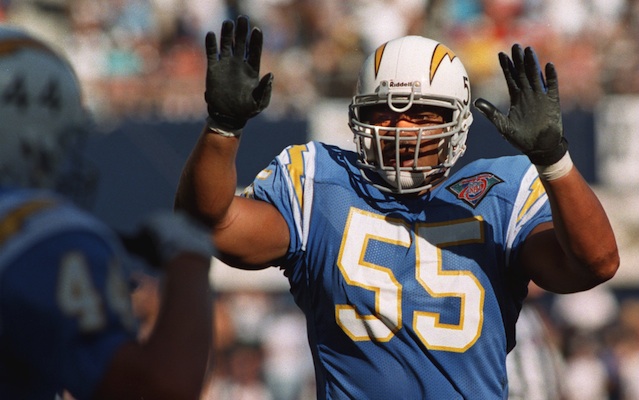
Seau played his final NFL game on Jan. 10, 2010.
To celebrate Seau's career means you also have to celebrate his life, and that's where things get complicated, because his life tragically ended on May 2, 2012, when Seau shot himself in the chest.
Eight months after Seau's death, he was diagnosed with CTE, a progressive degenerative disease of the brain that was likely brought on by playing football his entire life.
Seau's death will likely loom as a small shadow over his induction ceremony -- and it should -- but no one should let it overshadow the celebration of Seau's life.
What the Hall of Fame is celebrating on Saturday is a beloved football player who was adored by his family, his friends, his teammates and millions of fans.
Junior Seau's fans keep bringing flowers, candles to his home in Oceanside (PHOTO). pic.twitter.com/7X77QzUJ
— eric spillman (@ericspillman) May 3, 2012













